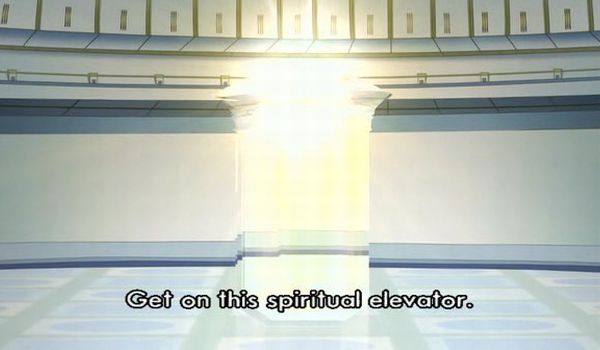
Get on this spiritual elevator… Â I think that is what the movie was meant to be too. But like this contraption, it will probably not work for everyone.
This animated movie is beautiful, preachy, thought-provoking, and made by a religious organization that encourages selfless service and high technology, thus their name “Happy Science”. The movie, as a good spiritual elevator, starts at the bottom, assuming that you know nothing about Happy Science. For most non-Japanese (and probably most Japanese too) this is a pretty safe assumption. In fact, the movie does not require more than the most cursory idea about religion at all.
It starts in New York, as three friends visit the Edison Museum. They read a newspaper article from when Edison was alive, claiming that he was working on a “spirit phone” that would let people talk to the dead. (Evidently this was a joke Edison really pulled on reporters, not just in the anime.) The three friends are the Japanese Ryuta, his blond Caucasian friend Patrick, and their dark Hispanic friend Roberto. Given that this is a Japanese movie, feel free to guess who the main character is. When they come home, they are joined by the girl Yuko, a friend of them all but particularly Ryuta. (She is Japanese as well.) But before that, they have met a Native American shaman with a message from Edison: How to build the spirit phone!
Through hard work and genius (and a little prayer from the girl, who goes to a religious school), our friends complete the spirit phone and make contact with Edison. He congratulates them, but fades away while saying something about trouble, danger and help. But how will our friends help someone who is in the other world? Luckily, the machine activates again and brings a message from an ancient Incan shaman, God Eagle. After Yuko teaches them basic meditation, God Eagle is able to take their minds to the spirit realm without dying first. This is where the adventure really takes off.
They arrive in the fourth dimension, which we may call the first heaven. People here get used to living as spirits. Because they can now move freely along the time dimension at all, the people here have much more freedom than those on earth. However, not all are found worthy to get here. Probably the most disturbing part of the movie is the judgment of the recently dead. They are required to watch a movie of their lives, with their thoughts in life as soundtrack, together with their deceased friends and relatives. After that, the audience advises them on whether they should go to Heaven or Hell. O_O This is where I think the movie loses its otaku audience: If you’re an otaku, you know quite well that your dead great-grandma would tell you to go to Hell, if she saw you spending your days watching anime instead of studying. You would not feel inclined to take her advice though.
Actually, you don’t need to. Because the afterlife is entirely maintained by the mind, you can go to Heaven and still end up in Hell if that’s where you fit the best. This is shown on two occasions. First, right after arriving in the fourth dimension, Patrick and Roberto get into a quarrel, and the ground opens beneath their feet. They are snatched in the fall by God Eagle. However, having failed to learn their lesson in full, they eventually get jealous when their Japanese friends get through The Narrow Gate to the seventh dimension and they don’t. This time they go to Hell proper and are captured by Nietzsche and later chased by Hitler and an enormous, evil armored elephant. Hey, it’s an anime after all!
Unlike Dante, however, this movie is much more interested in showing off Heaven than Hell. So before this problem with Hell, all our friends move on to the fifth and sixth dimension. They find a place of striking beauty and a heavenly laboratory where scientists continue making inventions and artists continue making art. To get to the world of the angels and bodhisattvas, however, they need to do selfless service. This is where our foreign friends fail: They do their service, but they expect to be thanked and rewarded. They could have stayed in the pretty sixth dimension (that would be the third heaven), but they just could not get over being snubbed by God. They grow evil inside and utter blasphemy. Down they go!
Meanwhile the angels in Dimension 7 explain the meaning of many things to our main characters. Trying to improve the lot of others through selfless service is what angels /bodhisattvas do. (In this movie, angels are treated as former humans, rather than separate creations. Actually they correspond more to the Catholic and Orthodox notion of saints. But again, this is translated from Japanese, so give them some room. Even many westerners don’t know the difference.) These holy beings may choose be born on Earth to make some difference here. Some of them even go down to Hell to rescue the damned who have had some time to reflect on their present condition.
This is borne out in the movie, and we have some high drama and action. Ryuta turns out to have unsuspected spiritual powers, and his girl friend (who is by now starting to realize that she is also his girlfriend) seems to amplify them. They defeat Nietzsche, then Hitler by the power of their love and escape from Hell with their friends, an army of demons on their heels. Luckily the angels have been warned and stand ready to defend Heaven from the dark incursion. Order is restored, and Ryuta and Yuko are rewarded with a ticket to the the ninth dimension, the home of the world’s highest humanoid gods: Jesus, Moses, Confucius, Newton, and the big boss himself, El Cantare, formerly known as Buddha, Hermes and several others.
Unfortunately, this is where the movie goes downhill in my eyes. Not that the 9th dimension is not impressive, but our hero goes there specifically to learn the reason for the world’s existence and secrets like that. In the end, however, the secret knowledge he is given, is unlocking his memory of his incarnation in Atlantis, and finding out that Yuko was his girlfriend already then.
Perhaps I am just crazy, but if I got an appointment with GOD in Heaven, I would not be interested in who my soulmate was, but rather something more cosmic, please. Then again, this may be because I don’t have a soulmate. Or perhaps this may be why I don’t have a soulmate…Â Anyway, Ryuta and Yuko seem very satisfied with the revelation, and vow to live lives worthy of the truth they have seen in the spirit realm. They seem to also have gained the ability to see the radiance of angels that are incarnated as babies. After a long love song, the movie ends.
This review may sound cynical, but the truth is that I found the movie surprisingly uplifting. Part of it is probably that its worldview has so much in common with my own, what with the successive layers of reality being ever more luminous and powerful, but also ever more demanding of those who would visit them. I have written a lot about this already, have I not? I was around 20 when this notion started to burrow into me, and pestering me to write a novel about it. I still haven’t managed to write that novel, but now I have realized that we all visit other worlds with our mind, that the body can not follow. As such, the plot of this movie hits home.
I don’t see myself bowing down to worship El Cantare, honestly. But I feel that I have gained an added respect for my own religion, and many other. This would probably not have happened if I was at the “science must die so Noah can live” stage of religion (the Blue level in Spiral Dynamics), but at the “Adam & Evolution” stage (Yellow level) I am willing to try everything and keep what is good. And that, frankly, is what one should do even if not religious at all. If it makes you feel like you want to do good to people and be impressed with the universe, it is probably worth watching. And watching again.




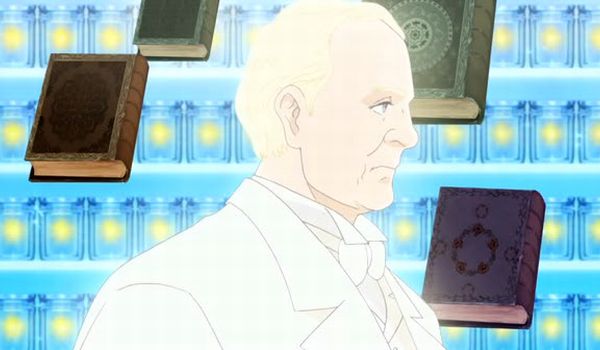
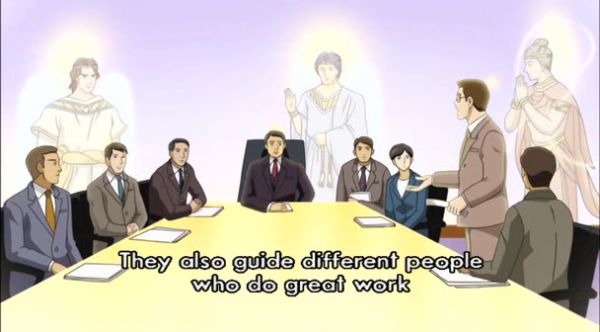



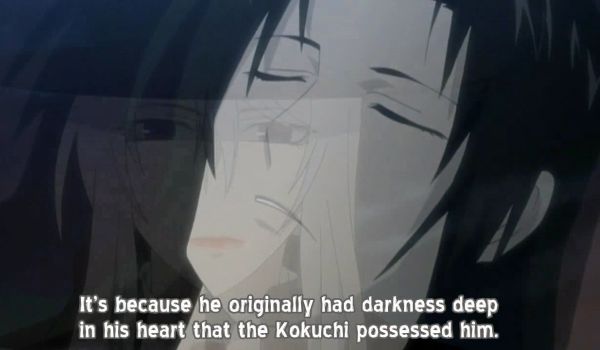
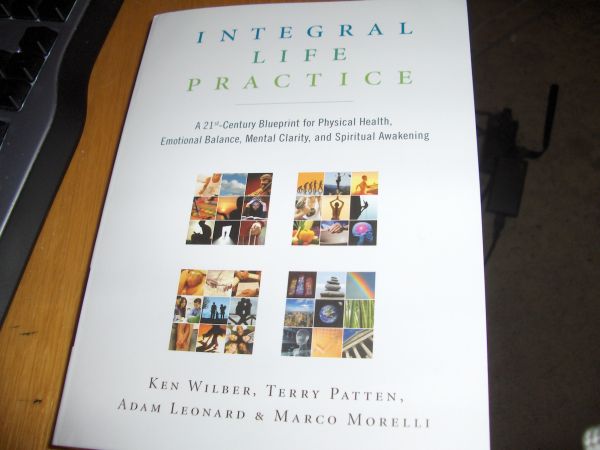 Proof that I have at least unpacked it!
Proof that I have at least unpacked it!